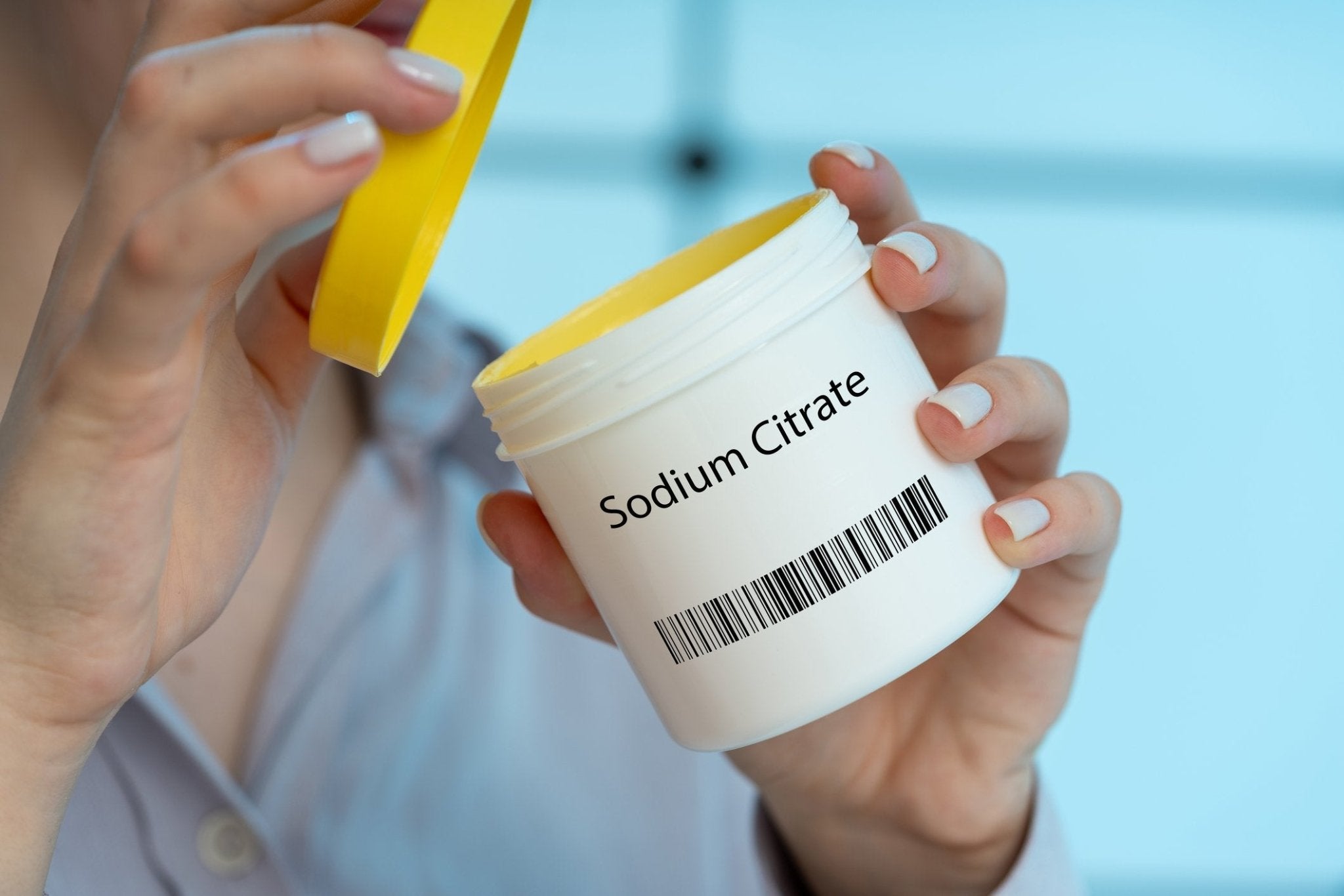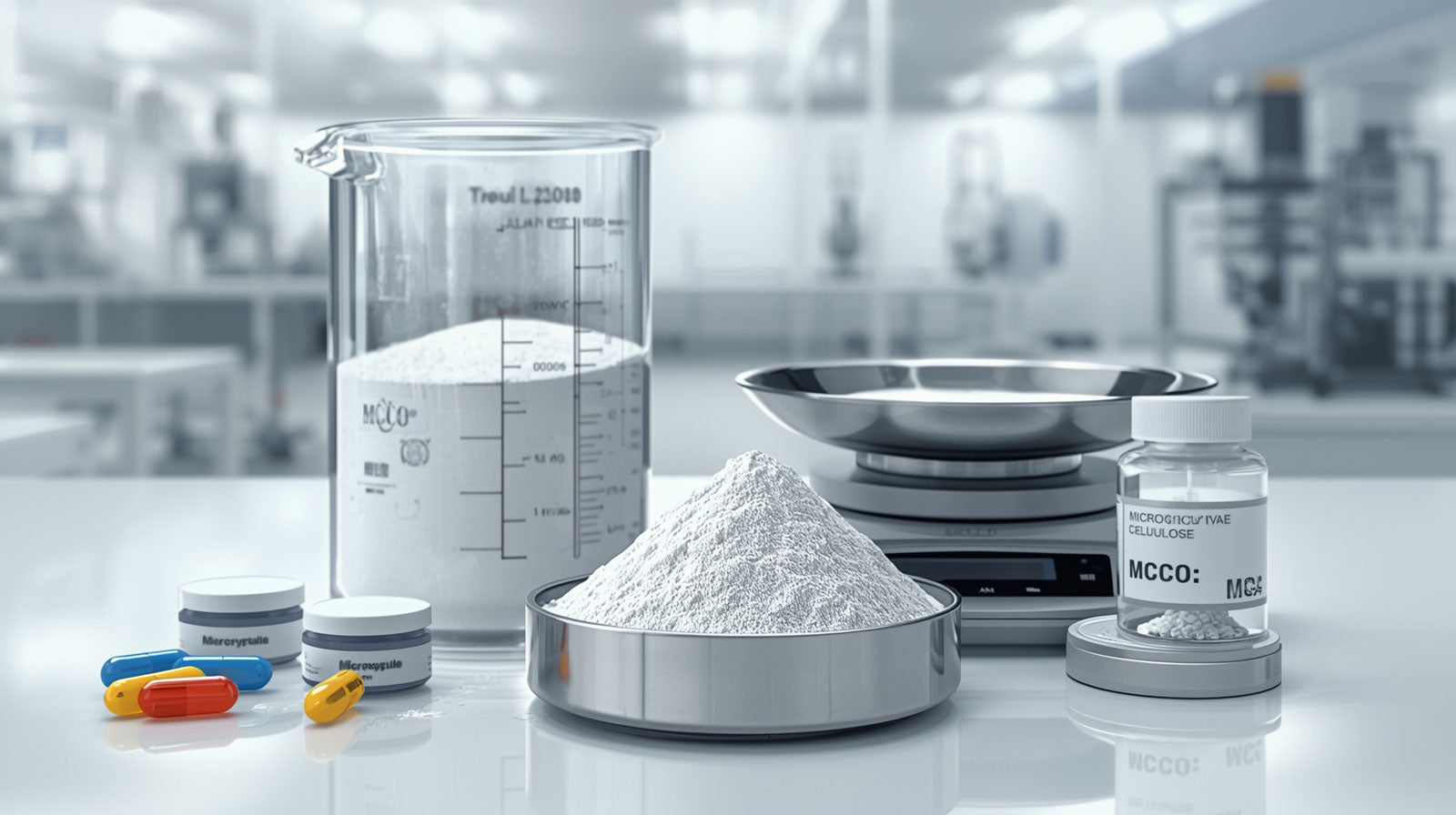
What is Sodium Citrate: Uses, Interactions, Benefits & More
SUBSCRIBE TO OUR BLOG
Promotions, new products, and recipes.
The seemingly unremarkable substance known as sodium citrate is actually incredibly important in various aspects of our lives. From medical treatments to the food industry, and even kidney health, this adaptable material has a multitude of advantages. Today we explore exactly what it is that makes sodium citrate so special and its numerous uses across industries including medicine, nutrition production, beverage alteration, and more!
Not only will we be looking at just why it’s such an essential element, but also any associated side effects which could occur if used improperly or without caution. Specifically with regards to solutions featuring both citric acid & oral solution. All while keeping an eye on how these make changes to foods too!
Short Summary
-
Sodium citrate is a versatile compound with a low concern level used as a pH buffer in the medical, and food industries.
-
It has a sour taste, health benefits & can improve the flavor of foods/beverages. Approved by FDA, EFSA & JECFA for use as an emulsifier, preservative, etc.
-
Can help prevent gout and kidney stones when taken orally under a doctor’s guidance. May cause side effects such as nausea or allergic reactions.
Understanding Sodium Citrate
Sodium citrate, the sodium salt derived from citric acid, is a multifaceted substance with multiple uses and it has been determined to present minimal risk as evidenced by data obtained through experiments or models. Its role of pH buffer regulates hydrogen ion concentration in solutions like trisodium citrate. Compared to other types of sodium salts, this chemical system can be especially useful for different industries such as medical and food services due to its salty yet sour taste that aids urine output modulation.

Chemical Structure
Sodium citrate is a powdery or crystalline material that absorbs moisture from the air to some extent. It can be dissolved in water quite easily, though it is practically insoluble when exposed to alcohols. The chemical formula of sodium citrate is Na3C6H5O7 and its use for medical purposes should always only take place with the consultation of an appropriate healthcare provider beforehand. Anyone planning on using this substance must bear in mind that moist air could have negative consequences for its stability, so care has to be taken accordingly as well.
Properties
Sodium citrate is an ideal compound that stands out due to its useful properties. This white, granular crystal or crystalline powder has a slightly salty and tangy taste with pH values between 7.5 and 9.0 when dissolved in water at 25°C (42.5 g/100ml). These characteristics make it suitable for various applications such as being used as a food additive, Enhancing the flavor of many dishes around the world where sodium citrate plays a big part!
Uses of Sodium Citrate
Sodium citrate is highly beneficial and has a wide range of uses across many different industries. In the food industry, this acidity regulator and emulsifier preserves quality in beverages as well as other products. It removes sulfur dioxide from smelter waste gases for environmental purposes too. Sodium citrate can be employed to act as an anticoagulant for blood or plasma that needs fractionation or storage. Official approval must be granted before its use in this way though. All these varied applications give evidence of its diverse capabilities when used correctly with care!

Medical Applications
Sodium citrate is used as an anticoagulant during plasmapheresis and also has the role of neutralizer in managing an upset stomach and acidic urine. It prevents blood clotting by slowing down or stopping some natural chemical processes that lead to coagulation, which makes it helpful for reducing gastrointestinal discomfort caused by too much acidity in the body’s fluids, including urine. The properties of sodium citrate make it great at acting as a countermeasure against symptoms like nausea and sourness in one’s digestive system while helping regulate pH levels back into balance.
Food Industry
Sodium citrate is used in the food industry to perform multiple functions, such as stabilizing emulsions and regulating pH. It mainly acts as a flavor enhancer or preservative when added to foods. Sodium citrate also has an essential role in spherification. Its addition reduces the acidity of edibles thus allowing for stronger acidic ingredients while undergoing this process.
Other Industries
Sodium citrate is widely used beyond the food and medical industries, for example in photography. Here it serves as a preservative to prevent bacterial growth within photographic solutions. In detergents too, sodium citrate can be found acting as a “builder”, boosting cleaning agent performance. This compound also appears in electroplating processes where its brightening effects make plated metals look more luminous. All these roles of sodium citrate demonstrate just how versatile this chemical is across multiple areas of industry.
Sodium Citrate and Citric Acid Oral Solution
 Sodium Citrate and Citric Acid Oral Solution is an alkalizing agent which works systemically. In 15mL or 30mL single-dose cups, the specific dosage of this remedy will vary depending on a person’s personal medical requirements and reaction to treatment.
Sodium Citrate and Citric Acid Oral Solution is an alkalizing agent which works systemically. In 15mL or 30mL single-dose cups, the specific dosage of this remedy will vary depending on a person’s personal medical requirements and reaction to treatment.
The pharmacological action of citrate involves binding calcium ions so that they cannot be part of the clotting cascade, balancing acid in both stomach fluids as well as urine pH levels. It also increases the solution pH value.
Composition and Dosage Form
This systemic alkalizing agent is formulated in a sugar-free liquid form and belongs to the drug class of urinary alkalinizers. Its generic name consists of two active components: sodium citrate and citric acid monohydrate, both combined into one oral solution. The solution contains dihydrate Sodium Citrate, Monohydrate Citric Acid as well as flavoring agents (e.g., purified water), sodium benzoate for preservative purposes, plus sucralose providing sweetening effects without any added sugars.
Indications and Usage
Sodium citrate is utilized as an alkalinizing agent to reduce the presence of excessive acid in both urine and blood, mainly used for treating metabolic acidosis. Sodium Citrate and Citric Acid Oral Solution can also help avert gout issues as well as some types of kidney stones, along with dealing with certain kinds of problems due to renal disease. This oral remedy works by making a systemic alkalizer that keeps level-headed pH balance while neutralizing stomach acids too.
It is advised to consume this solution orally following physician’s guidelines, typically four times per day but best taken after meals so that there will be less odds of facing diarrhea or digestive difficulties. Every dose should be stirred into cold water/juice (120-240 ml). After pouring it one ought drink all contents slowly until gone completely from glass.
Try Sodium Citrate Yourself
You might want to try a packet of Cape Crystal Brands Sodium Citrtate. You will be glad you did.
Side Effects and Precautions

When using Sodium Citrate and Citric Acid Oral Solution, it is important to be aware of possible side effects and take the necessary precautions. Commonly reported reactions include feeling nauseous, vomiting, having diarrhea, or experiencing abdominal pain. Allergic responses must also be watched out for. If any are encountered, medical attention should immediately follow suit. The solution created by combining sodium citrate and citric acid can potentially have detrimental impacts on one’s health, so make sure you know what risks could accompany its use before utilizing it!
Common Side Effects
Consumption of sodium citrate may result in nausea, an unpleasant feeling in the stomach, vomiting up contents from the stomach cavity, and diarrhea which is described as having frequent loose stools with a lot of water.
Allergic Reactions
In the event of an allergic reaction to sodium citrate, which may manifest in skin rashes, itching, hives, or difficulty breathing alongside swelling. It is crucial that one seek medical attention immediately.
Precautions
When taking Sodium Citrate and Citric Acid Oral Solution, it is important to make sure your doctor or pharmacist knows of any allergies or other medical issues you may have. It’s necessary to keep an eye on electrolyte levels whilst using this solution - for example by avoiding extra table salt in foods, drinking the medication with either water or juice and increasing fluid intake so as not to reduce side effects. Heed all instructions given by doctors/pharmacists when utilizing this acid based oral treatment.
Sodium Citrate and Kidney Health
 Studies have shown that sodium citrate can provide numerous benefits for kidney health, such as increased salt sensitivity and delayed damage to the organ. It may be able to stop the formation of calcium oxalate crystals from occurring in urine by increasing its content of citrate.
Studies have shown that sodium citrate can provide numerous benefits for kidney health, such as increased salt sensitivity and delayed damage to the organ. It may be able to stop the formation of calcium oxalate crystals from occurring in urine by increasing its content of citrate.
In regards to treating acute kidney injury, research suggests that this compound reduces inflammation levels and combats oxidative stress while keeping one’s salt balance intact.
Preventing Kidney Stones
Sodium citrate has the ability to counteract an overly acidic body, thus hampering calcium stones from forming or growing. It links with urinary calcium in a soluble form of citrate that diminishes salt supersaturation and suppresses crystal structure creation. Sodium citrate raises urine pH making it less acidic, which guards against kidney stone formation. On top of this effect as a diuretic by increasing urination volume – aiding in removing superfluous quantities of calcium or other substances possibly leading to forming renal calculi, is also one benefit provided by sodium citrate consumption.
Acute Kidney Injury
 When it comes to acute kidney injury (AKI), sodium citrate has been identified as a possible treatment option. It can help minimize salt sensitivity, slow down the development of damage to the kidneys and avert some metabolic complications associated with this condition. Essentially, by decreasing blood flow towards these organs, or possibly even protecting them from harm in other ways (either alone or in combination), this substance may be useful for dealing with AKI.
When it comes to acute kidney injury (AKI), sodium citrate has been identified as a possible treatment option. It can help minimize salt sensitivity, slow down the development of damage to the kidneys and avert some metabolic complications associated with this condition. Essentially, by decreasing blood flow towards these organs, or possibly even protecting them from harm in other ways (either alone or in combination), this substance may be useful for dealing with AKI.
Sodium Citrate in Food and Beverages
Sodium citrate is widely used in food and drinks as a stabilizer, preservative, buffer, and for flavor adjustment. It can be found in club soda, canned soft drinks and drink mixes due to its sour taste profile that matches with regulations on food additives established by the U.S. Food & Drug Administration (FDA), European Food Safety Authority (EFSA) or Joint FAO/WHO Expert Committee on Food Additives (JECFA). These institutions have all accepted sodium citrate’s use within these industries guaranteeing safe consumption making this chemical suitable for many popular beverages available today.
Food recipes that benefit from the use of sodium citrate
Cheese Sauce: Sodium citrate can be used to create smooth and velvety cheese sauces for dishes like mac and cheese, fondue, and nachos.
Sous Vide Meats: Incorporating sodium citrate into your sous-vide cooking can help enhance the texture and juiciness of meats like steak, chicken, and pork.
Ice Cream and Gelato: Sodium citrate can improve the texture of homemade ice cream and gelato, resulting in a creamier and smoother frozen treat.
Molecular Gastronomy Dishes: Explore the world of molecular gastronomy by using sodium citrate to create unique textures and presentations in dishes like foams, gels, and spheres.
Processed Foods: Sodium citrate is commonly used in processed foods such as canned goods, sausages, and processed cheeses to improve stability, flavor, and shelf life.
Emulsified Salad Dressings: Create creamy and stable emulsified salad dressings by incorporating sodium citrate.
Smoothies and Shakes: Add sodium citrate to your smoothies and shakes to prevent the separation of ingredients and create a more consistent texture.
Bakery Items: Enhance the texture and flavor of baked goods like cakes, muffins, and cookies by using sodium citrate in certain recipes.
Custards and Puddings: Sodium citrate can contribute to the smoothness and consistency of custards, puddings, and pastry creams.
Yogurt and Yogurt-Based Dishes: Use sodium citrate to stabilize and improve the texture of yogurt, yogurt-based sauces, and dressings.
Fruit Sorbets: Incorporating sodium citrate into fruit sorbets can help create a smoother texture and prevent ice crystals from forming.
Caramel and Butterscotch Sauces: Sodium citrate can aid in creating stable and smooth caramel and butterscotch sauces.
Fruit Jellies and Gummies: Sodium citrate can be used to make gelled fruit jellies and gummy candies with a consistent texture.
Melted Cheese Dips: Elevate your melted cheese dip game by using sodium citrate to achieve a silky-smooth and non-separating texture.
Frozen Yogurt: Similar to ice cream, sodium citrate can help improve the texture of homemade frozen yogurt.
Remember that sodium citrate is a versatile ingredient, but its usage should be carefully controlled to achieve the desired results without altering the taste or texture excessively. Always follow recommended guidelines and experiment with small amounts before incorporating them into larger recipes.
Sour Taste
The sour flavor of sodium citrate is attributed to the presence of its main component, citric acid. This makes it an excellent choice for accentuating or enhancing the taste of many food and drinks. Not only this, regular intake of it can even help prevent kidney stones along with decreasing acute kidney injury risks associated with consuming acidic products such as beverages and foods. It also functions as a popular addition to give better-tasting characteristics when used in recipes.
Food Additive Regulations
The use of sodium citrate as a food additive has been closely scrutinized for safety and subsequently approved by the FDA, EFSA, and JECFA. To this approval, it is allowed in processed foods according to IFOAM standards when manufactured with good practice.
In summary, Sodium citrate can be safely employed as an additive for various kinds of edible products without detrimentally impacting on their quality or putting consumers at risk.
Summary
In this exploration, we have investigated the vast array of uses for sodium citrate across many fields. In medical applications, it acts as an anticoagulant and a neutralizing agent. In food production, its properties lend itself to acting as both an emulsifier and an acid component. There are benefits towards kidney health, preventing the development of stones while being used to treat acute injuries too.
To summarise: Sodium citrate is indispensable for our everyday lives due not only to improving flavor but also aiding well-being with relevant precautions that should be taken when consuming solutions containing this compound or Citric Acid orally. Keeping these important considerations in mind will help us enjoy all of the positive effects of using sodium citrate safely!
Frequently Asked Questions
What does sodium citrate do?
Sodium citrate is used to ward off and treat the raised acidity levels in the body, potentially halting gout or kidney stones that are caused by too much uric acid. It works by reducing these high acid concentrations within one’s system.
Is sodium citrate safe in food?
Sodium citrate is used in food, acting as an acidic flavoring and antioxidant to regulate the acidity of desserts like jam or gelatin-based treats, candy, ice cream, etc. It also serves a preservative function for certain foods so they won’t discolor over time. This additive is known to be safe when consumed through various types of food consumption.
What is sodium citrate used for in the medical field?
Sodium citrate is widely utilized in medical procedures such as plasmapheresis, and to take care of ailments related to acidic urine or an upset stomach. It can be employed for relieving symptoms associated with these conditions.
How does sodium citrate help in preventing kidney stones?
Sodium citrate works to prevent kidney stones by boosting the levels of citrate in the urine, which inhibits calcium oxalate crystal formation. This helps stop the stone generation from occurring.
What are the side effects of sodium citrate?
Common side effects associated with sodium citrate can include nausea, vomiting, and diarrhea.


|
About the Author Ed is the founder of Cape Crystal Brands, editor of the Beginner’s Guide to Hydrocolloids, and a passionate advocate for making food science accessible to all. Discover premium ingredients, expert resources, and free formulation tools at capecrystalbrands.com/tools. — Ed |
Enjoyed this post? Subscribe to The Crystal Scoop
Food-science tips, ingredient know-how, and recipes. No spam—unsubscribe anytime.
- Choosing a selection results in a full page refresh.



